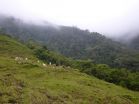(Press-News.org) Biologists at the University of York have taken an important step in making it possible to clean millions of hectares of land contaminated by explosives.
A team from the Centre for Novel Agricultural Products (CNAP) in the University's Department of Biology has unravelled the mechanism of TNT toxicity in plants raising the possibility of a new approach to explosives remediation technology. TNT has become an extensive global pollutant over the last 100 years and there are mounting concerns over its toxicity to biological systems.
The study, which is published in Science, also points to the potential of a new type of herbicide which could be used sustainably in rotation with other herbicide types, to limit the emergence of herbicide resistance.
TNT has a significant impact on the diversity of soil microbial communities and the establishment of vegetation. The majority of TNT remains in the roots of plants, where it inhibits growth and development. In the U.S. alone it is estimated that some 10 million hectares of military land is contaminated with munitions constituents.
But whereas it is possible to ban toxic and polluting chemicals, the huge demand for military explosives means that TNT will continue to be used globally on a massive scale.
The researchers discovered that a key plant enzyme -- MDHAR6 -- reacts with TNT, generating reactive superoxide, which is highly damaging to cells.
They found that mutant plants lacking the enzyme, previously implicated in protecting plants from stress, in fact have an enhanced TNT tolerance. By targeting this enzyme in relevant plant species, it may be possible to produce TNT resistant plants to revegetate and remediate explosives at contaminated sites such as military ranges and manufacturing waste sites.
Professor Neil Bruce, who led the research, said: "There is a lot of interest in natural mechanisms for the removal of recalcitrant toxic chemicals from the biosphere and because of the scale of explosives pollution, particularly on military training ranges, the remediation of polluted land and water as a result of military activity is a pressing global issue."
Dr Liz Rylott, who co-led the research, said: "Only by eliminating the acute phytotoxicity of TNT can plant-based systems be successfully used to clean-up contaminated sites. Our work is an important step on that journey."
Since MDHAR6 is plant specific, compounds that react with the enzyme in the same way as TNT, yet are readily degraded in the environment, could also be screened for herbicide potential.
Professor Bruce added: "This is an important additional finding as it is an increasing concern that although herbicide resistance has been increasing steadily since the 1970s, no new herbicide mode of action has been commercialized since the 1980s."
INFORMATION:
Researchers at VIB (a leading life sciences institute in Flanders, Belgium) and Ghent University have successfully established a causal relationship between exposure to so-called farm dust and protection against asthma and allergies. This breakthrough discovery is a major step forward towards the development of an asthma vaccine. The results of the research were published in the leading journal Science.
It is commonly known that drinking raw cow's milk can provide protection against allergies. A 14-member research team, led by professors Bart Lambrecht and Hamida Hammad ...
Evidence from a new study published in PLOS Computational Biology by researchers from Brown University and led by Assistant Professor Thomas Serre suggests that when we analyze scenery we simply make the easiest judgments first, rather than following a priority order of categories.
There are many ways we understand scenery. Is it navigable or obstructed? Natural or man-made? A face or not a face? In previous experiments, researchers have found that some categorization tasks seem special, in that they occur earlier than others, leading to a hypothesis that the brain has ...
Rodents huddle together when it is cold, they separate when it is warm, and at moderate temperatures they cycle between the warm center and the cold edges of the group. In a new study published in PLOS Computational Biology, Jonathan Glancy, Roderich Gross, Jim Stone and Stuart Wilson from the University of Sheffield found they could simulate huddling by assuming simply that touching individuals in turn brings their temperatures closer to an ideal body temperature. According to the model, these selfish individual behaviours improved the ability of the whole group to regulate ...
Why aren't there more lions? That was what puzzled McGill PhD student Ian Hatton, when he started looking at the proportion of predators to prey across dozens of parks in East and Southern Africa. In this case, the answer had nothing to do with isolated human hunters. The parks were teeming with potentially tasty treats for the lions. So one might imagine that the population of lions in each park would increase to match the available prey. Instead, what Hatton and the McGill-led team discovered was that, in a very systematic way, in crowded settings, prey reproduced less ...
CAMBRIDGE, Mass. (September 3, 2015) - A protein known to play a role in transporting the molecular contents of normal cells into and out of various intracellular compartments can also turn such cells cancerous by stimulating a key growth-control pathway.
By conducting a large-scale search for regulators of the signaling pathway known as PI3K/AKT, which promotes cell survival, growth, and proliferation--and which is highly active in cancer cells--researchers at Whitehead Institute and Memorial Sloan-Kettering Cancer Center have implicated the protein RAB35 in the oncogenic ...
For millions of years, the Pacific and North American plates have been sliding past -- and crashing into -- one another. This ongoing conflict creates uplift, the geological phenomenon that formed mountains along the west coast.
A new analysis by UC Santa Barbara earth scientist Alex Simms demonstrates that the Pacific coastlines of North America are not uplifting as rapidly as previously thought. The results appear in the journal Geological Society of America Bulletin.
"Current models overestimate uplift rates by an average of 40 percent," said Simms, an associate ...
Hurricane Jimena, a once powerful Category 4 storm with maximum sustained winds estimated at 140 mph by the National Hurricane Center, has continued to weaken well east of Hawaii. The Global Precipitation Measurement or GPM core satellite analyzed rainfall rates and saw the eyewall was eroding.
The eyewall of a hurricane contains a storm's most damaging winds and intense rainfall. It consists of a vertical wall of powerful thunderstorms circling a hurricane's open eye.
GPM is a joint mission between NASA and the Japanese space agency JAXA. GPM captured data on Jimena ...
The world is facing an extinction crisis as more and more forests are converted into farmland. But does it help when farms share the land with birds and other animals?
The short answer is "no," according to new evidence based on the diversity of bird species reported in the Cell Press journal Current Biology on September 3. If the goal is to preserve more bird species, representing a greater span of evolutionary history, then it's better to farm more intensively in some areas while leaving more blocks of land entirely alone. In other words, land-sparing wins out over ...
High levels of saturated fat in the blood could make an individual more prone to inflammation and tissue damage, a new study suggests.
Received wisdom on the health risks of eating saturated fat has been called into question recently. This new research supports the view that excessive consumption of saturated fat can be bad for us.
Scientists from Imperial College London studied mice that have an unusually high level of saturated fat circulating in their blood. The research, published today (3 September 2015) in Cell Reports shows that the presence of saturated fats ...
Giving cancer patients aspirin at the same time as immunotherapy could dramatically boost the effectiveness of the treatment, according to new research published in the journal Cell today (Thursday).
Francis Crick Institute researchers, funded by Cancer Research UK, have shown that skin, breast and bowel cancer cells often produce large amounts of prostaglandin E2 (PGE2). This molecule dampens down the immune system's normal response to attack faulty cells, which helps cancer to hide. It is a trick that allows the tumour to thrive and may explain why some immunotherapy ...



